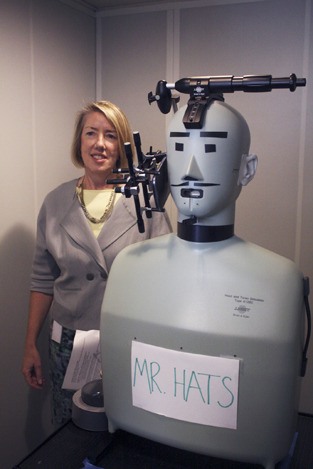A robot named Mr. Hats listens as noise is piped in from every angle. Meanwhile, Tappy, another robo-tester, mashes buttons and commands for 24 hours straight. At the same time, a model of a head is scanned in different positions in a room adorned with bright blue and yellow foamed cones.
This is the scene inside T-Mobile’s Factoria Device Lab, the place where all phones go for testing before they hit the market. They are tested for everything from call clarity to water resistance, to resilience when dropped by the customer.
The company gave a rare glimpse into how it checks the quality of devices as part of its 10th anniversary celebration this week. The company also rolled out a series of new features that officials hope will propel it into closer competition with the top two wireless carriers, AT&T and Verizon.
Having come a long way from its first innovation, the Sidekick, T-Mobile plans to offer unlimited 4G smartphone data plans, and complete a $4 billion investment into its network following a failed merger deal between the Bellevue-based company and AT&T.
“We like to consider ourselves the ‘Un-carrier,’” said Brad Duea, senior vice-president of product management. “Where the other guys are actually going to limited buckets and forcing families to share, we are going the other way with unlimited 4G data. No throttles, no overages, but unlimited 4G data.”
T-Mobile can’t always compete in some of the more rural areas, said David Mayo, senior vice president of technology, strategy, finance and development, but the company will continue to build up its Metro offerings. The company’s 4G network is available to more than 220 million customers nationwide, and T-Mobile will begin rolling out the next iteration, LTE, in 2013 when technology behind the devices should make them more affordable.
Already attempting to rattle the cage of other carriers with its image, T-Mobile has a plan for the one piece of technology it cannot boast, the iPhone. The company does not sell it because it hasn’t found “the right commercial relationship” with Apple, Mayo said, and the costs that come along with retailing the popular device. But Duea said the company is encouraging customers to bring unlocked iPhones and sign up with T-Mobile’s new data plans, which retail for as low as $69.99 a month.
T-Mobile tests
Devices at T-Mobile go through a litany of tests before they can come to market. The company demonstrated some of these methods.
Tappy: These robots feature arms that constantly perform various functions on the phone (texting, phone calls, launching apps, etc.). These machines put phones through a 24-hour stress test to make sure the devices can handle high usage without the software crashing.
Mr. Hats: This talkative robot is on the phone all over the place. Technicians pipe in dialogue on repeat, while simulating a variety of noises, such as wind from an open car window. The calls come from a sound-sealed room, and technicians on the other line test the phones for call clarity.
Drop tests: T-Mobile has a number of machines to simulate the effect of a phone flying out of the owner’s pocket. Phones are tossed about 125 times by a machine that relates to a three-foot drop, to make sure they will not break.
Signal strength: Phones are placed in the hands of a model robot in a variety of different positions to see how people can best hold devices to avoid blocking signal.
The Bellevue Reporter is a sister paper of the Mercer Island Reporter.



